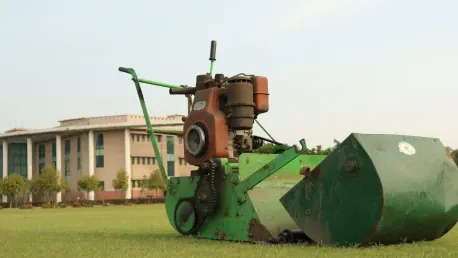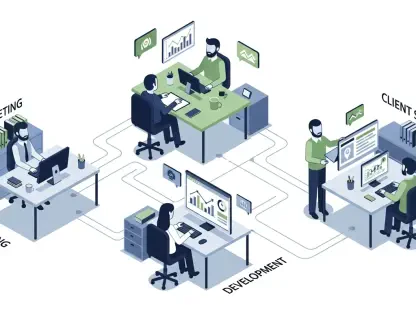The European agrifoodtech sector has been experiencing significant changes in recent years, particularly in terms of investment patterns. These shifts are reflective of broader economic, environmental, and geopolitical uncertainties that have prompted a renewed focus on resilience and sustainability within the industry.
Investment Climate Overview
Recent Decline in Funding
European agrifoodtech investments have witnessed a marked decline, with a 29% drop from 2023 to 2024. Despite this reduction, funding levels still surpass those seen before the COVID-19 pandemic. This drop, from $5.4 billion to $3.8 billion, indicates that the industry has not only been affected by the recent economic downturn but also a reversion to more conservative investment practices reminiscent of pre-pandemic norms. While the current levels are above the figures seen in 2020 ($3.1 billion) and 2019 ($3.5 billion), the sharp decline underscores the sector’s vulnerability to global disruptions.
The UK’s Role
The UK has played a prominent role in the investment landscape, contributing $650 million in 2024. When considering the UK’s significant investments, the overall European funding figures align closely with those from 2020. This indicates that while some regions maintain substantial investment activity, others have receded more dramatically. The UK’s strong presence is a testament to its enduring commitment to advancing agrifood technologies. However, the overall funding landscape remains complex, with varying levels of investment across different European countries, highlighting a fragmented approach to agrifoodtech advancements.
Factors Influencing Investment Patterns
Macroeconomic and Geopolitical Influences
Several macroeconomic trends, including the U.S. trade war, and climate-related impacts, are influencing investment decisions significantly. Additionally, the ongoing war in Ukraine has affected energy prices, contributing to the overall uncertainty in the market. These geopolitical tensions have created a precarious environment for investment, causing investors to exercise greater caution. The fluctuating energy prices have particularly impacted sectors reliant on energy-intensive processes, further complicating investment decisions in agrifood technologies.
European Commission’s Focus on Resilience
The European Commission has been emphasizing self-sufficiency and resilience in response to these global disruptions. This focus has guided investment toward technologies that enhance food security and supply chain stability. By advocating for stockpiling supplies and prioritizing resilience, the European Commission aims to mitigate the risks posed by global disruptions. This emphasis on resilience has prompted a shift toward investing in technologies that bolster local food production, reduce reliance on imports, and enhance overall supply chain robustness. The Commission’s vision is to create a sustainable and resilient agrifood sector capable of withstanding various external shocks.
Predictions and Investor Sentiment
Mixed Outlook for 2025
Industry experts have differing viewpoints regarding the future of agrifoodtech investments. Some foresee a recovery in 2025, while others predict continued challenges in the funding landscape. Johan Jörgensen of Sweden Foodtech is optimistic about the recovery, believing that the sector’s resilience focus will attract substantial investments. Conversely, Max Brandes from Rentenbank suggests that the funding landscape may remain stagnant, with potential further declines in valuations. This divergence in outlook reflects the inherent uncertainties in the sector, influenced by external economic and geopolitical factors.
The Impact of Dry Powder
There is a significant amount of uninvested capital, or “dry powder,” that could drive future investments and support startup funding in the sector. The existence of this capital reserve suggests that as market conditions stabilize, there could be a resurgence of investment activity. Investors may begin to deploy these funds strategically, targeting innovative startups and technologies that align with the resilience and sustainability goals set by the European Commission. The deployment of this dry powder could be a key driver in reviving the sector and fostering new growth opportunities.
Shift Towards Resilience-Oriented Technologies
Importance of Food Security and Supply Chain Resilience
Investments are increasingly targeting technologies critical for food security and supply chain resilience. This shift aligns with the European Commission’s vision of reducing dependencies and enhancing standardization. By focusing on resilience-oriented technologies, investors aim to create a robust agrifood system capable of enduring and adapting to disruptions. Technologies such as precision agriculture, climate-smart farming practices, and advanced supply chain management systems are attracting significant interest. These technologies not only enhance food security but also contribute to the overall sustainability of the agrifood sector.
Notable Investment Examples
Recent investments include Finnforel’s $260 million raise for aquaculture systems and Green Genius’ $110 million for bioenergy expansion in Lithuania, exemplifying the focus on resilience. These investments highlight a targeted approach to enhancing specific areas within the agrifood sector that are critical for long-term sustainability. Finnforel’s investment in recirculating aquaculture systems aims to create a more sustainable and controlled fish farming environment, while Green Genius’ bioenergy projects focus on renewable energy solutions vital for reducing dependence on non-renewable energy sources. These examples underscore the sector’s shift towards building a resilient and sustainable agrifood ecosystem.
Continued Investment in eGrocery
Growth and Stability in the eGrocery Sector
Despite broader shifts towards resilience, the eGrocery sector continues to attract significant investment due to its predictable growth and tangible assets, which remain appealing in uncertain times. The stability and reliability of the eGrocery sector make it a favorable investment option, even when other areas of the agrifood sector face volatility. The sector’s ability to provide essential services consistently, even during disruptions, has enhanced its attractiveness to investors. This focus on eGrocery stems from its established market position and potential for sustained growth, a desirable quality in an unpredictable investment landscape.
Major Deals and Trends
The eGrocery sector saw substantial funding with $792 million raised across 20 deals in 2024, highlighting its enduring attractiveness to investors. This significant infusion of capital underscores the sector’s resilience and capacity to adapt to evolving consumer demands. Investments in this area are driven by the sector’s ability to leverage technology to enhance efficiency and customer experience. Innovations such as improved logistics, automation in order fulfillment, and enhanced delivery services are central to maintaining the growth and competitiveness of the eGrocery sector. These trends point to an ongoing commitment from investors to support and expand this key component of the agrifood ecosystem.
Country-Specific Insights
Germany’s Agritech Industry
Germany, a key player in the agritech sector, experienced a 32% drop in funding to $561 million in 2024. The country’s regulatory environment often drives innovation, particularly in areas like regenerative agriculture. Despite the decrease in funding, Germany remains a significant contributor to agritech advancements due to its strong institutional support and focus on sustainable practices. The country’s regulatory framework encourages innovation by prioritizing environmental and animal welfare standards. This focus on sustainable practices aligns with broader European goals of building a resilient and self-sufficient agrifood sector.
Challenges in Germany’s Startup Ecosystem
Germany’s fragmented startup ecosystem poses challenges for investors seeking early-stage companies, making it difficult to navigate the landscape efficiently. The presence of multiple universities and innovation hubs creates a diverse but scattered ecosystem, complicating access to early-stage ventures. This fragmentation often results in promising startups struggling to secure funding and scale their operations. However, the continued emphasis on sustainable and regenerative practices within Germany’s regulatory framework presents opportunities for targeted investments. Addressing these challenges requires a more cohesive approach to fostering innovation and supporting early-stage companies within the German agrifood sector.
Future Investment Areas
Promising Sectors
Future investments are likely to focus on precision agriculture, climate-adaptive technologies, and alternatives to natural ingredients. These areas are critical for advancing sustainability and supply chain transparency. Precision agriculture technologies that optimize resource use and improve crop yields are expected to attract significant investment. Similarly, innovations in climate-adaptive technologies are essential for enhancing the sector’s resilience to climate change. Alternatives to natural ingredients, such as plant-based proteins and functional food components, are also gaining traction as they address consumer demand for healthier and more sustainable food options.
Support from Institutions
Institutions like the EIC are pivotal in supporting startups through various funding mechanisms, underscoring the role of public funding in driving innovation and growth within the sector. The support from such institutions is crucial for sustaining the momentum of innovation and ensuring that promising startups receive the necessary resources to bring their technologies to market. Public funding initiatives help bridge the gap between early-stage innovation and commercial viability, fostering a vibrant ecosystem of agrifood tech startups. This consolidated effort from both public and private sectors is essential for driving the sustained growth and development of the agrifood tech industry.
Innovating for the Future
The European agrifoodtech sector is undergoing considerable transformation, especially regarding investment dynamics. These changes mirror wider economic, environmental, and geopolitical uncertainties currently influencing the world. As a result, there is an intensified emphasis on resilience and sustainability within the industry. Recent years have seen shifts in where and how investments are directed within agrifoodtech. The sector is increasingly focusing on creating sustainable food production methods and enhancing supply chain resilience. This shift isn’t just a reaction to immediate challenges but part of a broader strategy to make the sector more robust in the long run. In the face of climate change, economic instability, and geopolitical tensions, investors are prioritizing technologies and practices that can better withstand such disruptions. Innovations in areas like precision farming, alternative proteins, and the development of sustainable packaging solutions are gaining traction and attracting increased funding. Moreover, there’s a growing recognition of the importance of local food systems and shorter supply chains as these can reduce vulnerability to global supply chain disruptions. Companies that can offer solutions aligned with these new priorities are seeing more interest and investment. Overall, the European agrifoodtech sector is becoming more focused on creating a sustainable, resilient future, driven by the need to adapt to an increasingly uncertain global landscape.









